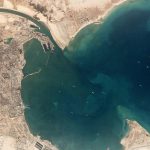Hungary has warned it cannot accept the EU’s planned ban on Russian oil as it would amount to an “atomic bomb” for its economy, threatening to scupper the bloc’s sixth sanctions package against Moscow.
Prime minister Viktor Orban – no stranger to disputes with the bloc’s executive – told state radio he was ready to negotiate on any proposal that would meet Hungary’s interests.
But he declared that what was on the table, currently, would prove too costly.
The country currently sources almost 60% of its oil supplies from Russia.
Please use Chrome browser for a more accessible video player
European Commission president Ursula von der Leyen used a speech to the European parliament in Strasbourg on Wednesday to declare that the time had come for the bloc to ban Russian oil supplies within six months and refined products by the end of the year.
She said then: “It will not be easy. Some member states are strongly dependent on Russian oil. But we simply have to work on it.”
“(Vladimir) Putin must pay a price, a high price, for his brutal aggression.”
‘Destruction of UK pig sector’ looms unless Tesco pulls its weight, chain is warned
Thousands of jobs at risk as convenience store giant McColl’s teeters on brink of collapse
Elon Musk secures £7bn from new investors to pay for Twitter takeover
The proposal, part of a new round of measures aimed at punishing Russia for its invasion of Ukraine, follows a similar move announced by Britain and the United States in March.
Hungary’s opposition to the EU’s plan poses a threat to the embargo as it requires the support of all 27 member states to be approved.
It was only made possible after Germany, Europe’s largest economy, declared that it was now in a position to source the supplies it needed from elsewhere.
In his radio interview Mr Orban, who was re-elected for a fourth term last month and is widely seen as a Putin ally, voiced concern about the EU’s backlash against Russia’s actions.
He reiterated that Hungary would not send weapons to Ukraine, like some other member states, insisting his country’s stance was “for peace”.






















